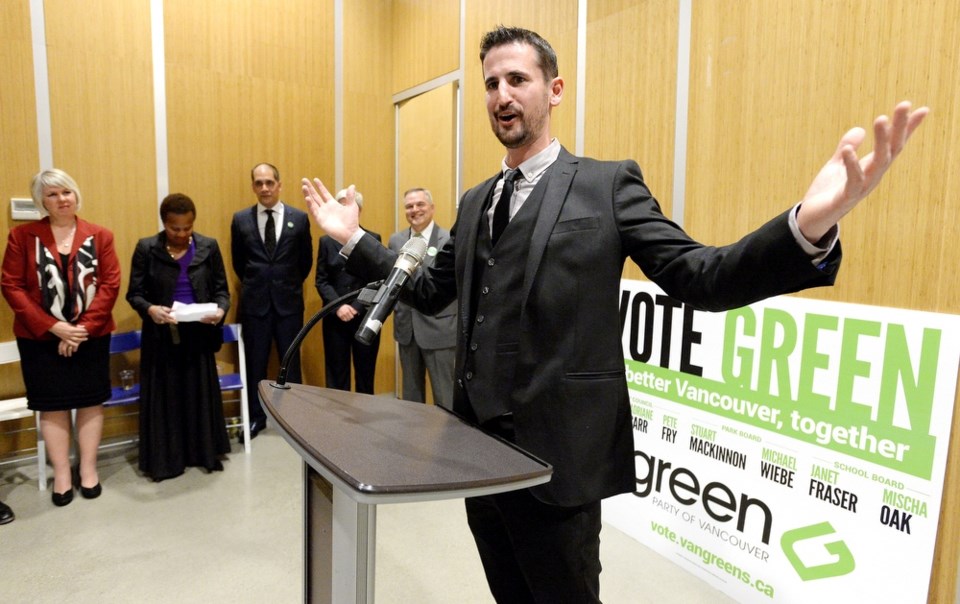Aurora Faulkner-Killam made the statement on the second day of a hearing in B.C. Supreme Court but didn’t elaborate on the influence or name the party, although Glacier Media and other news outlets have reported on the case’s links to the Vancouver NPA.
Those links include lawyer Wes Mussio, an NPA board member, acting on behalf of the 15 citizens, or petitioners in the court action. NPA president David Mawhinney and retired lawyer Michael Redmond, also a member of the party, are among the petitioners.
Both Mussio and Redmond, who was the citizen who triggered an investigation into Wiebe’s votes in May 2020 over a temporary patio program, have previously denied to Glacier Media that politics was at play in the legal fight with the councillor.
In court, Faulkner-Killam said the B.C. legislature recognizes that elected officials “operate in a different world,” that they “take collective action” and are accountable at the ballot box. The system and rules that apply to politicians “have to differentiate from us [lawyers] so government can function,” she said.
“My submission is this petition is being brought with heavy influence from a political party and it is not the intent of the [B.C.] legislature to provide a vehicle for partisan disputes,” Faulkner-Killam said. “Rather, legislation is intended to balance the needs of local governments, with the need for accountability.”
The case concerns Wiebe’s decision to vote on the program that allowed restaurants, bars and breweries to apply for a permit to set up a temporary patio for customers. The purpose, as stated by council in its unanimous votes in May 2020, was to assist businesses hit with financial hardship because of the pandemic.
Wiebe owns Eight ½ restaurant in Mount Pleasant and is an investor in Portside Pub in Gastown. Both businesses were awarded permits, with Eight ½ restaurant among the first 14 successful applicants.
Both Faulkner-Killam and Mussio largely focused their arguments Thursday on sections of the Vancouver Charter and whether Wiebe had a pecuniary interest in voting for the program. Mussio said Wiebe did, Faulkner-Killam said he didn’t.
Mussio argued Wiebe did not consult the city manager, the city’s legal department or his own lawyer before his votes. He also pointed out that Wiebe amended the temporary patio policy to allow city staff to deal directly with businesses.
In addition, Mussio argued, the program did not provide a benefit city-wide to the estimated 450,000 electors in Vancouver. Instead, just over 300 businesses, including those connected to Wiebe, benefited from council’s decision.
“We’re talking about a program that helped out 334 businesses — we’re not talking about a city-wide program,” said Mussio, who pointed out an exception from a conflict of interest, as stated in the Charter, is if the pecuniary interest of a councillor is an interest “in common with electors of the city generally.”
Added Mussio: “[Wiebe] had a very distinct pecuniary interest here — it’s called a business, called a restaurant, called a bar, and that restaurant and bar would profit from these [council] motions.”
Faulkner-Killam argued Wiebe’s ownership of his restaurant and being an investor in a bar were declared in his financial disclosure statement posted on the city’s website in January 2020, which is accessible to citizens.
Her argument is that Wiebe acted in good faith in voting for the temporary patio program.
“You don’t have to declare a conflict if you have no conflict in the matter, and if you do not believe that you have a conflict in the matter,”she told the court. “So if the matter, or the interest in the matter, is in common with the electors or remote, then there is no conflict. Full stop.”
Added Faulkner-Killam: “And if you are wrong on all of that — you got it wrong and screwed up — you may still be saved on the basis of good faith or inadvertent error.”
B.C. Supreme Court Justice John Steeves is presiding over the case from Victoria. Wiebe and the lawyers, including one from the City of Vancouver, have been present via video link. Media were given access via telephone.
In Wednesday’s session, Steeves ruled a report authored by lawyer Raymond Young last year into Wiebe’s conduct as inadmissible in the proceedings. The report was ordered by Mayor Kennedy Stewart, who was acting in his role as mayor as set out in the city’s Code of Conduct for council and staff.
Young’s report concluded Wiebe should be disqualified from holding office until the election in October 2022 and the he should resign. Young outlined in his report that if Wiebe chose not to resign that court action could be initiated by citizens, or the city itself.
The case was originally scheduled for two days but it’s expected to take at least another two days to complete and resume May 31. Wiebe, meanwhile, continues his duties as a councillor on the 11-member council, where the NPA holds four seats and the Greens three.
@Howellings



